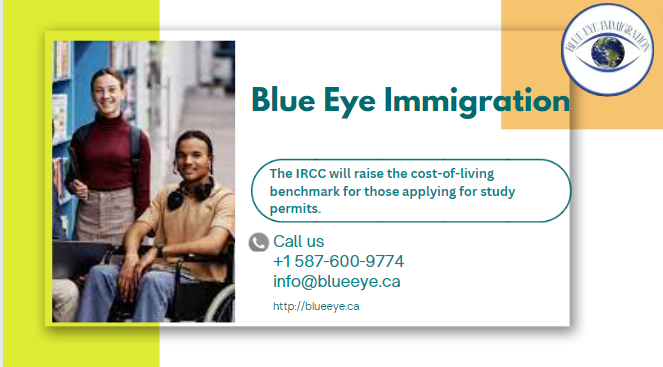Beginning on January 1, 2024, Immigration, Refugees and Citizenship Canada (IRCC) will increase the cost-of-living threshold for applicants seeking study permits.
The cost-of-living criteria for a single applicant seeking a study permit will be $20,635 as of January 1. This is applicable to study permit applications received on or after January 1st, and it is in addition to the first year’s tuition and travel expenses.
The existing threshold of $10,000, which was introduced in the early 2000s and has not been changed since, is more than twice as high as the new cost.
According to the IRCC, financial requirements have not kept up with the rising cost of living in Canada, and as a result, students are coming and finding their finances do not cover all of their expenses.
The agency reports that in addition to the increase effective January 1st, the cost-of-living requirement will now be modified annually in tandem with Statistics Canada’s modification of the low-income cut-off (LICO). In Canada, LICO is regarded as the minimal income required in order to prevent people from having to spend a larger percentage of their income on needs.
Additionally, according to the department, the Student Direct Stream (SDS) would be subject to the new financial standards. Faster processing is available for citizens of 14 countries applying for study permits through the SDS stream.
Although it acknowledges that the impact may differ for each prospective candidate, the IRCC claims that modifying the cost-of-living standard will assist reduce student vulnerability and exploitation. In order to support underrepresented cohorts of overseas students pursuing their studies in Canada, it also states that it will launch targeted pilots the following year.
Extending Students’ Working Hours
The IRCC also said that it will be extending the exemption from the 20 hours of work per week cap for international students until April 30, 2024, in addition to the cost-of-living requirement. This extension is only available to students who are currently in Canada and who, by December 7th, 2023, have already applied for a study permit.
First proposed on November 15, 2022, the bill was supposed to be in effect until December 31, 2023. Students might work more than the typical 20 hours a week while classes are in session.
In Canada, students may be permitted to work while enrolled in classes provided they:
- possess a current study permit;
- are enrolled full-time in an approved educational program;
- have begun their studies and continue to maintain an acceptable level of academic standing as specified by their school;
- are enrolled in a minimum six-month academic, vocational, or professional training program that grants a degree, diploma, or certificate; and
- own a SIN, or Social Security Number.
Minister Miller also announced two things pertaining to Post Graduation Work Permits (PGWPs) during today’s news conference.
First, the policy that permits foreign students to use school terms spent studying online toward their eventual PGWP will be extended until September 1st, 2024 (so long as the time spent studying does not account for more than half of the student’s overall program duration).
Second, PGWPs will not be further extended in a specific manner. The Canadian government has used a unique interim policy three times to prolong PGWPs for a total of eighteen months. People whose work permits expire as late as December 31, 2023, and who are qualified to apply under the most recent extension policy may do so; however, the IRCC will not attempt to renew PGWPs after this time has passed.
